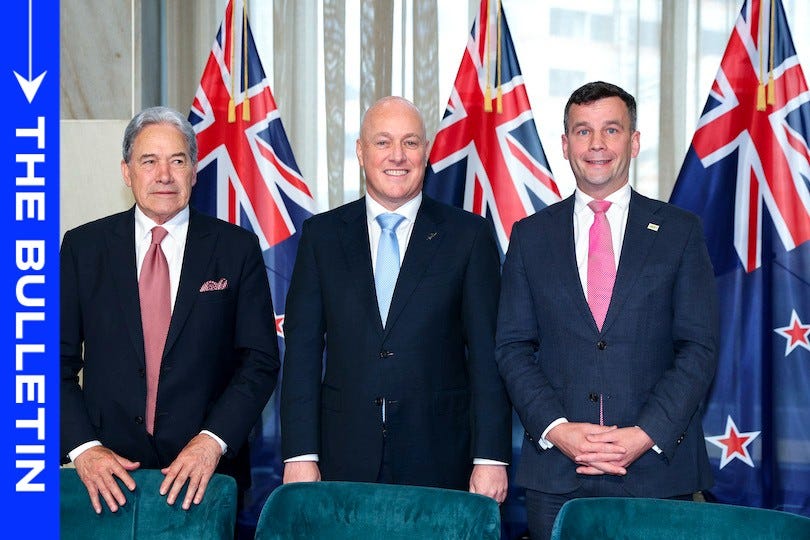Pharmac budget boost goes beyond National’s cancer drug promise
But does it risk leading to underinvestment in the future?
Mōrena, and welcome to The Bulletin for Tuesday, June 25.
In today’s edition: Wayne Brown criticises the cost of initial plans for a second harbour crossing in Auckland, the “nuts” cause of Northland’s pylon collapse, and Scott Robertson has named his first All Blacks squad. But first, the government has finally revealed its plan to fund new cancer drugs.
Blowing the budget
Pharmac’s been given a $604m budget boost, in line with reports that emerged before the weekend. The prime minister called the new money “transformative” for Pharmac and for the New Zealanders – an estimated 175,000 of them – who will receive treatments as a result. The Post broke down the key details, reporting that the new money would fund up to seven of the named cancer drugs promised by National before the election, while health minister Shane Reti said the remaining six will be replaced by “alternatives just as good or better”. Along with cancer treatments, there will be 28 new medicines funded for other health conditions. The Herald’s Claire Trevett writes (paywalled) that the government has “supersized” its election promise, but not necessarily because it chose to. “Pharmac pretty much just told the government how much money it would take to cover all the drugs on its priority list up to the point that the last of those 13 drugs (or the equivalents) would be included.”
Health advocates have welcomed the announcement, reports The Post this morning. “Out of the chaos has come good,” said Patient Voice Aotearoa spokesperson Malcolm Mulholland.
How we ended up here
I’ve shared it before, but I’ll share it again – this has been a long road and The Spinoff’s Alice Neville wrote a really useful timeline of the cancer drugs promise, and the aftermath of it being broken, earlier this month. As Neville explained, the National Party launched the pledge in August year, but by the time the coalition agreements had been signed just a few months later, there was no longer any mention of it. In March, reported The Post’s Rachel Thomas, concerns started to emerge that the government may attempt to override Pharmac’s political neutrality in its efforts to meet its exact pre-election promise. Remember, Pharmac is meant to operate at arm’s length from the government and even how it prioritises what drugs to fund is kept secret to avoid interference. Pharmac’s former chair Steve Maharey got into hot water last year after writing political columns seen to take a stance on political issues, for example.
Perhaps more importantly, as this Stuff explainer illustrates, Pharmac negotiates with pharmaceutical companies to get medicines at the best price. The risk from naming the drugs ahead of that bargaining process was that the prices could be hiked significantly. The Pharmac minister David Seymour hinted at this last week in an interview with RNZ’s Checkpoint last week, saying that politics had got in the way of the best deal for New Zealanders. Chris Jackson, an oncology professor from Otago University and one of the people who wrote the initial drug wishlist that National relied on, was also one of those expressing concern that Pharmac could be overruled by the current government and that better drugs could be left off the list as a result. In comments to the Science Media Centre yesterday, he said he was pleased the normal process would be followed, but warned that the health system was already stretched and may struggle to administer these treatments as many are delivered over the course of several hours.
Where the money’s coming from
It’s quite early for pre-budget announcements given it’s less than a month since Budget 2024 was unveiled. However, that’s effectively what this new Pharmac boost is. Luxon told reporters the money, which will be spread out over four years, was a pre-commitment out of next year’s budget – a budget which the government has already set a very tight new spending allowance of $2.4bn for. Newsroom Pro’s Marc Daalder (paywalled) looks at that here, writing that the government risks “underfunding and underinvesting in the future in order to make the maths work in the present”.
Luxon indicated that further savings drives, such as those seen across the public sector, would be needed to find the cash. In her analysis last night, Newshub’s Jenna Lynch said that while the government maintained it was always going to follow through on its health promise, “the proximity to last month's budget and the fact they have had to book the cost against next year's budget tells us this was rushed together in the face of a backlash they were not expecting”. A number of parties put forward Pharmac proposals before the election, as this piece from The Conversation looked at. National was unique in promising ring-fenced funding for particular medicines.
Sorry seems to be the hardest word
It’s undoubtedly good news that the government has come to the table, but the political mess was avoidable. Cancer sufferers have had weeks of waiting to learn their fate, and the government has so far only apologised for not communicating better on budget day. As 1News’ Felix Desmarais reported, the one word the prime minister would not say to those who had been waiting until yesterday’s announcement was “sorry”. Labour leader Chris Hipkins told reporters that wasn’t good enough. “If he [Luxon] had funded Pharmac from the start he could’ve saved so many families the anguish of waiting.” Desmarais has also wrapped political reaction from the Greens, with co-leader Marama Davidson, who is about to take leave after a breast cancer diagnosis, welcoming the funding announcement. But, Davidson said more could be done to address health inequities among cancer patients, such as access to support.
There still remains some uncertainty given that not all 13 drugs named by National last year have received funding. Newshub’s Jenna Lynch spoke to a woman currently paying $5,000 a month for her treatment, one that was promised in the election campaign but left off the latest list. "I'm really pleased for Pharmac and for New Zealand in general, but on a personal level, a little confused and uncertain still," she said. Reti said he could not commit to when those remaining six treatments may be funded, but confirmed the announced health package will start to roll out from October.
Join The Spinoff Members
“The Spinoff is one of the great pleasures of my reading life, the repository of timely and quality journalism that continues to surprise, delight and inform.” Denise, Spinoff Member since 2020.
If, like Denise, you enjoy our work and want to support us, please consider becoming a member today. Already a member? Ka nui te mihi, your support means the world to us.
The cost of considering a second harbour crossing
Initial plans for an additional crossing over the Waitematā Harbour in Auckland have cost more than $36m, BusinessDesk’s Oliver Lewis reports today, with the NZ Transport Agency footing the bill. Mayor Wayne Brown described it as a “waste of money” and called the suggestion of a harbour tunnel “stupidly expensive”, in emails reacting to the spending. The last government unveiled plans for two road tunnels and a future light rail link between the city and the North Shore at a potential cost of $45bn, though this has been scuppered by the coalition. Transport minister Simeon Brown called that proposal “unaffordable, unrealistic and unfunded”. Brown said the majority of spending on the business case had been spent before the last election and work was now under way to consider how to progress the project in a cost-effective manner.
The ‘inconceivable’ reason Northland lost power
A widespread power outage in Northland last week was caused seemingly by human error. As RNZ reported here, Transpower revealed that too many nuts were removed from bolts at the base of the large pylon, causing it to topple. It occurred during routine maintenance, but typical procedures were not followed. "It is unprecedented and inconceivable that so many nuts were removed at once,” said Transpower boss Alison Andrew. An external investigation will be carried out to look at what happened and why procedures weren’t followed. “We are committed to learning from this event and implementing any additional controls that may be identified," Andrew said.
Burning homefires: Climate adaptation and the struggle for landback
When ahi kaa defend their land, it’s seldom recognised as a form of climate adaptation. That’s because ahi kaa are rarely telling the story.
In a new podcast by Te Kōmata o te Tonga and The Spinoff, Nadine Hura and Ruia Aperahama talk to researchers keeping their homefires burning about how they’re adapting to the changing climate. Listen, now.
Click and Collect
The decision in the sentencing of former Green MP Golriz Ghahraman has been reserved until Thursday afternoon.
Invercargill’s mayor Nobby Clark will take a month off work after facing a call to resign last week. Clark says that, with reflection, he came back to work “too early after open heart surgery”.
Suspended Green MP Darleen Tana has been referred to police over an alleged failure to include an authorisation statement in an election advert. This is separate from the claims of migrant exploitation that prompted Tana’s lengthy stand down from parliament.
Scott Robertson has named his first All Blacks squad, including five uncapped players.
The Warehouse’s shares fell to a record low on Monday. BusinessDesk’s Gregor Thompson looks at why (paywalled).
New Zealand’s last remaining elephant, Burma, will head to her new home in Australia later this year. This Herald feature is a really great insight into the team that look after the famous elephant, including Andrew Coers who has worked with Burma “for the last 25 years” (paywalled).
I shared a review of Charli XCX’s incredible album Brat a couple of weeks back. As a follow-up, I suggest Duncan Greive writing on the return of “horny and hypermelodic” pop stars.
Sinking lids and rising profits: Shanti Mathias examines the double bind of councils regulating pokies. "You should learn from history, not repeat it": Toby Manhire talks to Geoffery Palmer about rapid reforms. Rachel King explains why she is no longer writing novels for adults. Reo Māori content powerhouse Te Māngai Pāho is “facing a fiscal cliff”, reports Liam Rātana. Duncan Greive wonders if this is the end of NZ reality TV as we know it; on another note, here's all the new movies and TV on streaming services this week.
That’s it for The Bulletin today, thanks for reading. I’ll be back tomorrow.
Let me know in the comments, or get in touch with me at thebulletin@thespinoff.co.nz, if you have any feedback on today’s issue or anything in the news.
If you liked what you read today, share The Bulletin with friends, family and colleagues.















